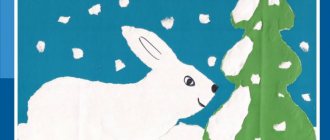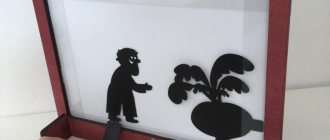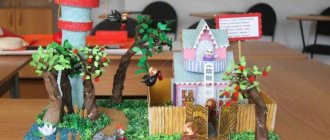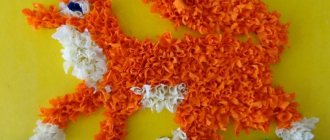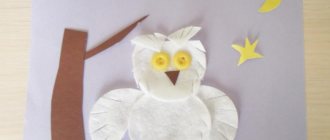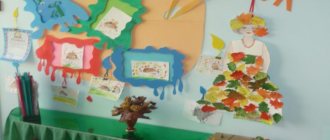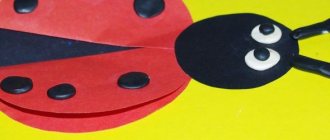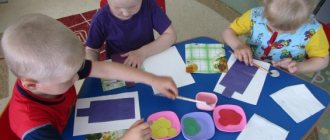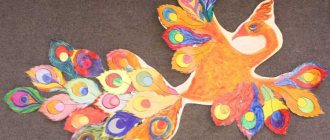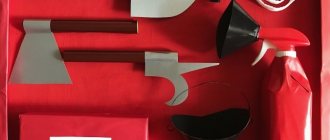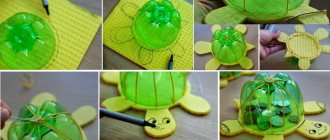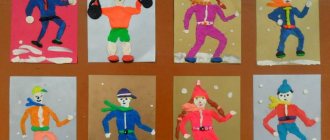Subjects of winter applications
The main subjects for winter applications are, of course, winter. It's snow, snow and snow again. Snow on the roofs of village houses, snow on bare tree branches, snow on Christmas trees, and, of course, a snowman. In addition to Santa Claus, deer, polar bears, and penguins are frequent guests of the applications.
Attributes of New Year's fun: skates and skis or winter accessories: warm mittens, hats and scarves are also popular in winter scenes. And, of course, a decorated Christmas tree.
MAGAZINE Preschooler.RF
Summary of an open lesson on appliqué in the senior group “Winter-Winter”Winner of the all-Russian competition “The most popular article of the month ” JANUARY 2018
Goal: To teach children to create an applicative image of a winter landscape on a cardboard plate.
Tasks:
- Teach children to correctly place appliqué parts on a circle (cardboard plates)
- Improve skills in working with scissors, glue, and brush
- Create conditions for experimenting with artistic tools, with various materials (brushes, dabbing, dry poking, cotton swabs, white paper, cotton wool)
- Develop a sense of shape, color, rhythm
- Foster independence and initiative in work
Progress of the lesson.
Music by A. Vivaldi “The Seasons” (winter)
Troika, troika arrived. The horses in that trio are white. And in the sleigh sits Queen Belokozha, white-faced. As she waved her sleeve, she covered everything with silver.
That's right, guys. This is winter. Look at the posters, paintings. What a beauty! This year Winter came late. He doesn’t want to give a white outfit to the earth and trees.
Let's play. Suddenly Winter will send us white snow.
Game "Cold Words"
Winter, frost, refrigerator, snow, ice cream, blizzard, cold, snowdrift, ice, blizzard.
Well done, children! They came up with good words for Winter.
How many winter months are there? What are their names?
Now let's play the game “December, January, February”
December - hands up
January - forward
February - omit.
How attentive and smart you are!
Guys! Many artists loved to depict winter. They choose very beautiful or somewhat unusual views of nature.
But the beauty of nature can be conveyed not only with colors, music, words (A.S. Pushkin “Winter Morning” ), but also with the help of paper. Yes Yes.
What is the name of the art when images are created from paper? (Applique) Today you and I will also turn into artists and create. Let's create a winter landscape from paper. Now let's rest a little.
Fizminutka
A blizzard blows over the fields, over the mountains, over the forests. Look to the right, to the left. Bullfinches are sitting on the branches. (flapping their “wings” ) It’s very cold in winter. The birds want to go home (squat) We will feed the bullfinches (sprinkle food) It will be more fun for the birds (jump in place, clapping your hands)
Examining a sample
Based on what form we will create a winter landscape today? That's right, based on a circle (cardboard plate).
- What is in the center of the plate? (house) What parts does it consist of? What colour is he?
- What is located to the left of the house, what is shown on the right?
- What is the best way to arrange these details on a plate?
- What colors of paper do we use?
Now let’s prepare the handles for appliqué.
P/g "Winter walk"
1, 2, 3, 4, 5 (we bend our fingers) We went for a walk in the yard (we walk along the table with our fingers) We sculpt a snow woman, (we “roll” a snowball) We fed the birds with crumbs, Then we rode down the hill (we move with the index finger of our right hand on the left palm) And they were also lying in the snow (shake off palms) Everyone came home in the snow, ate soup and went to bed.
Teacher's explanation
First, we cut out the elements we need for our work. We lay out the house.
- What color is the house?
- We will make a house from a rectangle and a triangle.
- Which elements do we have first, and which ones later?
- What will we use as snow? (cotton wool + napkins)
- How will we cut down the trees?
Independent activities of children
The teacher prompts, corrects, and helps those children who need help.
Lesson results
What did we do in class today?
What did you like most?
| Next > |
Curly hole punchers to help
If you haven’t yet appreciated the convenience of using shaped hole punches in applique, then it’s time to buy a couple. Perfect little snowflakes that come out with just one click are simply miraculous!
Children will “spank” them with delight, and any applique decorated with such snowflakes will look much more interesting.
Drawing + applique
The applique can be combined with a pattern. On the Internet there are a lot of pictures for appliqué depicting houses, penguins, snowmen, etc. This template just needs to be printed, cut out and glued to a base of colored cardboard
The best color for a winter background is blue or blue. The drawing is painted with paints or felt-tip pens, and everything that is snowy or white in color is filled in with appliqué.
Deer from disposable tableware
If you have a plastic plate lying around from an autumn picnic, you can use it in a winter composition. Application pictures can be found in the public domain. The work is suitable for all ages. How to do it:
- The plastic plate is cut into two parts (one is made a little larger). Next it is painted brown - this will be the body of the deer;
- horns can be made from colored paper. The child places his hand on the sheet and traces it with a simple pencil. After this, they are cut out with scissors;
- The background of the applique will be blue cardboard - a plate, pre-cut legs and horns are glued onto it.
It looks very interesting and unusual. Quite suitable for a winter competition.
Cityscape
If you are wondering how to make winter applique with your own hands, use the following idea. For a winter cityscape you will need colored paper and cotton pads.
Identical rectangles are cut out of paper of different colors to depict multi-story buildings. On them you need to stick small squares of blue or yellow windows, as if there were lights in the windows, if we are depicting an evening landscape.
For doors, you can use paper in a contrasting color. Half a cotton pad will replace snow-covered roofs.
In order for the composition to look harmonious, the width of the “houses” should be equal to the width of the cotton pad. The picture can be simple, in one row, or with perspective.
Then the rows of houses - “streets” - begin to be glued from the middle part of the sheet, the bottom row of each street is covered with a row of “drifts” of whole cotton pads, moving down, the next row of houses is glued in a checkerboard pattern.
The bottom of the applique is also decorated with “drifts”. A snow-covered tree will add charm to the city landscape; the trunk is cut out of brown colored paper, and the crown is depicted with cotton pads.
Crafts from cotton swabs
Cotton swabs are a simple budget material. It can be easily cut, painted, glued. It is not surprising that it began to be actively used in art classes.
Snowflakes
The light weight of cotton swabs allows them to be glued even with ordinary PVA. Older children can come up with patterns for snowflakes themselves. You can offer kids ready-made templates - printed diagrams on which they will lay out the parts before gluing.
Snowman
It’s even more interesting to collect three-dimensional figures from cotton swabs.
Elementary technique:
- You can use polystyrene foam as a base into which the sticks will be stuck. Due to its high density, plasticine can crumble.
- One edge of the stick needs to be cleaned so that it sticks in easily.
- The tiers can be secured together with a toothpick or pastry skewer.
For the eyes and buttons, the sticks need to be painted first, otherwise the work may get dirty.
Applications
For applications you will need not only cotton swabs, but also a background. If the material is not painted, you should choose a dark base. This will make the drawing look more contrasting.
On the panel, sticks can turn into logs of a house, spruce paws and branches of snow-covered trees. Some examples of use should be shown to children in advance, inviting them to further show their imagination.
Applications based on ready-made templates
A wonderful template for a winter applique in the form of a penguin or snowman can be downloaded on the Internet. An interesting effect is obtained if you use foam tape rather than glue to glue parts. This way the parts do not fit tightly together, and the image becomes more voluminous. The main thing is to think in advance about the sequence of gluing the parts.
Preparatory group. Senior preschool age. Children 6-7 years old
Organized educational activity on the application for children of senior preschool age “Bullfinches on a branch” Objectives: Teach children to work with templates. Teach children to do appliqué . Strengthen children's ability to use scissors. Develop fine motor skills. To develop children's ability to convey the image of birds. Form creative imagination. Materials: -Sample. -Cutting template….
Photo report on the appliqué lesson in the preparatory group “Snowman in the Forest” Purpose: To teach children to create an expressive image of a picture using various means of productive activity. Tasks. — Learn to create an expressive image of a snowman or Christmas tree; - Continue to teach how to convey the shape, the proportional relationship of the parts of the snowman; - Continue to learn...
Applications from “palms”
Children's favorite hand appliques are also popular in winter themes. Green “palms” make a wonderful Christmas tree, which children can decorate to their taste with ready-made stars, bows (such shaped hole punches also exist), sparkles, buttons, sequins, and anything else.
Do you remember the poem “It was in January.”? Tell it to your child while you glue on ten bunny faces peeking out from under the Christmas tree paws.
Crafts from pine cones
Cones for work are collected in the fall. But by the winter holidays they will be completely dry and ready for work.
Christmas tree
You can turn a separate cone into a Christmas tree if you paint it and decorate it with beads. A large tree made of pine cones will look more impressive at an exhibition or children's creativity competition.
To work you will need:
- cardboard cone;
- thick glue or plasticine;
- paints, large beads or small balls.
The cones are simply glued onto the prepared cone. Empty areas can be covered with beads or textile bows. There is no need to paint the craft.
Velvet applications
Among the various photos of winter appliqué, there are many interesting options using multi-colored velvet and woolen threads. You can cut a mitten or a hat from velvet. The top of the hat can be decorated with a real pom-pom made of thread or a cotton ball; the bottom of the mitten can be covered with scraps of cotton wool, which will depict a fur edge.
You can embroider a snowflake on a mitten with woolen thread or depict a knitted pattern with pieces of multi-colored velvet. And the hat can be striped from different colors of velvet.
Bead crafts
Beads are a difficult material to work with. It requires skill and thoroughness. You can offer such ideas to children from 10 years old.
Snowflakes
To ensure that the craft retains its shape, the work is done on thin wire. In this case, a needle is not required. But you need basic diagrams - notes in what order to collect the snowflake - center and rows or each ray separately. You can diversify the ornaments with large beads, glass beads, and sequins.
Herringbone
The spruce branch will even hold on to the fishing line. Each branch is a thread threaded through 3-4 beads on a “back and forth” principle with one transverse at the tip. Children can be shown the diagram and asked to choose their own size and color.
Angel
Simple flat angels are assembled from beads and beads in a few minutes. To make a three-dimensional craft, you need to change the triangular base to a cone. If you master the technique, the hem can be made lace.
Large story collage
Older children can create a “Winter Fun” applique.
If a large group of children has gathered, you can make a large collage. To begin, draw a pencil sketch depicting hills from which skiers will roll, ice slides for sledding, a skating rink for figure skaters or hockey players. Mark places for fir trees and birches. It is good to imitate the crown of birch trees with crumpled pieces of a white napkin. For Christmas trees, use triangles of green paper or quarters of cotton pads.
Figures of people can be drawn with pencils and felt-tip pens and cut out. We cut out skis and ski poles from strips of colored paper, and ice cubes or “cheesecakes” from bright circles. The blades of the skates can be completed.
When working with children, the main thing is not to dictate any rules to them, but only to introduce them to the possibilities of using different materials, to offer some idea, and then the uncontrollable children’s imagination will do everything itself.
Crafts from plasticine
Plasticine is the most popular material in kindergarten. Working with him develops perseverance and fine motor skills. An exhibition of crafts for the New Year can be arranged right under the Christmas tree or a bouquet of pine branches.
Father Frost
To work, children will need at least three colors of plasticine. The main one is red, from which a cone-shaped fur coat is made. Additionally, you need to sculpt the head, white beard and mustache. Another color will be needed for mittens and felt boots. The main task is to show working techniques so that the fur on clothes and hair turn out to be realistic.
Herringbone
There are many options for how to depict a Christmas tree. The simplest one is to outline the silhouettes of spruce needles on triangles glued to paper. A Christmas tree made from rope looks voluminous and more interesting.
Technique:
- Roll out green plasticine into a long, smooth rope.
- On the creativity board we lay a circle for the bottom tier - this is the largest diameter.
- We lay the bundle on the support in a spiral, gradually making the circles smaller. The tip becomes a sharp point.
You can place balls or beads rolled from colored plasticine along the rings of stylized Christmas tree tiers.
Applications
Applications made from plasticine are embossed. Children can master dozens of techniques with the material:
- simple smoothing of plasticine over the base with your palm and fingers;
- perforating and creating relief with a stick or stick;
- gluing the material with flakes;
- imprint on plasticine using auxiliary materials - cups, spoons, parts of toys.
A winter hut, a forest, or fairy-tale characters may appear on the collage. Children can come up with a plot and story about their creation themselves - tell who lives in this house and what happened to the characters.
Photo of winter applique
0
